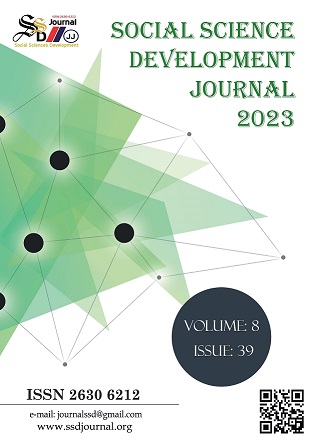HÂLİDÎ ŞEYHİ AHMED b. SÜLEYMAN el-ERVÂDÎ’NİN ZİKİR ANLAYIŞI
DOI:
https://doi.org/10.31567/ssd.983Anahtar Kelimeler:
Ervâdî, zikir, zikrin faydalarıÖzet
Trablusşam müftüsü olarak da bilinen Ervâdî, mutasavvıf bir alimdir. Mevlânâ Hâlid elBağdâdî’nin sonuncu halifesi ve Ahmed Ziyâeddîn Gümüşhânevî’nin de hocasıdır. Ervâdî, devrin
ileri gelen alimlerinden İslami ilimleri öğrenip icazet almıştır. Daha sonra tasavvufa yönelmiş, seyr
ü sülûk eğitimini tamamlayarak birçok tarîkattan icazet almıştır. Çok sayıda tarîkattan icazetli
olmasına rağmen Nakşbendî-Hâlidîlik esas ve usulüne göre irşad faaliyetlerinde bulunmuştur.
Birçok talebe yetiştiren Ervâdî yüz yirmiden fazla eser telif etmiştir. Eserlerinin çoğu risale
şeklindedir. Ervâdî, eserlerinde; sohbet, rabıta, intisap, halvet ve zikir gibi birçok konuyu işlemiş,
görüşler belirtmiştir. Biz bu makalemizde Ervâdî’nin zikir anlayışı üzerinde duracağız. Tasavvufta
önemli bir yer tutan zikir, hatırlamak, zihinde tutmak, unutmamak, yad etmek anlamlarına gelir.
Zikir, Kur’an-ı Kerim'de müştaklarıyla beraber iki yüz elli altı yerde geçmektedir. Tasavvuf erbabı
zikri ayet ve hadislerin ışığında tarikatların üssü’l-esası saymışlardır. Ervâdî, manevi gelişim
sürecinde zikrin önemini, hangi lafızlarla zikrin yapılacağını, zikrin usul ve adabını, zikrin
faydalarını ve zikirden hasıl olan on makamı eserlerinde işlemiştir.




